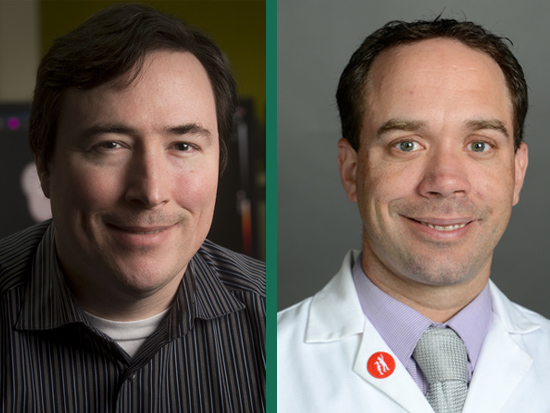 Jonathan McConathy, M.D., Ph.D. (left) and Corey Falcon, M.D. (right) The University of Alabama at Birmingham has been awarded two grants totaling $262,824 from the St. Baldrick’s Foundation, a volunteer-powered charity dedicated to raising money for childhood cancer research. UAB researchers Jonathan McConathy, M.D., Ph.D., associate professor in the UAB Division of Molecular Imaging and Therapeutics, and Corey Falcon, M.D., fellow in the UAB Department of Pediatrics, were awarded the grants to continue looking for cures and better treatments for all childhood cancers.
Jonathan McConathy, M.D., Ph.D. (left) and Corey Falcon, M.D. (right) The University of Alabama at Birmingham has been awarded two grants totaling $262,824 from the St. Baldrick’s Foundation, a volunteer-powered charity dedicated to raising money for childhood cancer research. UAB researchers Jonathan McConathy, M.D., Ph.D., associate professor in the UAB Division of Molecular Imaging and Therapeutics, and Corey Falcon, M.D., fellow in the UAB Department of Pediatrics, were awarded the grants to continue looking for cures and better treatments for all childhood cancers.
McConathy received $99,375 to use a powerful new combination of imaging techniques to guide the treatment of children with brain tumors, help surgeons plan brain tumor surgery and detect residual tumor after surgery to plan the next steps in treatment.
Working with a team of physicians at UAB and Children’s of Alabama, this project will use a novel hybrid PET/MRI system combined with a PET tracer called FET, produced by the UAB Cyclotron Facility, to visualize increased amino acid transport by brain tumors. In the long term, this technique has the potential to improve the lives of children with brain tumors by providing better imaging-guided treatments and speeding the development of new therapies by providing a more rapid and accurate determination of whether the treatment is working. The team includes Alyssa Reddy, M.D., professor in the UAB Division of Hematology and Oncology; Jeff Blount, M.D., professor in the UAB Division of Neurosurgery and chief of Pediatric Neurosurgery at COA; and Sumit Singh, M.D., pediatric radiologist at COA.
Falcon received a $163,449 grant from the https://www.stbaldricks.org/hero-funds/notallwhowander/">Not All Who Wander Are Lost Fund to continue his research aimed at creating a novel strategy around cellular suicide gene, or cells that kill themselves through apoptosis. The strategy can be used to eliminate chimeric antigen receptor (CAR) redirecting human T-cells (CAR-T) that target pediatric acute lymphoblastic leukemia cells. Unlike low- or average-risk pediatric ALL, a subset of high-risk ALL remains resistant to traditional chemotherapy resulting in frequent relapse and recurrence of disease.
CAR-T cells are emerging rapidly as an extremely promising treatment for refractory leukemia. However, the cells do carry the intrinsic risks of excess proliferation, insertional mutagenesis, anaphylaxis, and “on-target/off-tumor” side effects resulting in potentially severe cytokine release syndrome, fatal organ damage and death. The development of a reliable suicide safety switch for CAR-T cells gone wrong could ameliorate these dangerous side effects on demand and significantly enhance the safety of this promising therapy. Falcon’s research team includes Antonio Di Stasi, M.D., assistant professor in the UAB Division of Hematology and Oncology and the https://www.uab.edu/medicine/bonemarrow/">UAB Bone Marrow Transplantation and Cell Therapy Program Unit, and Frederick Goldman, M.D., professor and director of the https://www.uab.edu/medicine/peds/hemonc-research-prog/bmt-research">UAB Pediatric Bone Marrow Transplant Program.
Every two minutes, a child is diagnosed with cancer worldwide. One in five kids diagnosed in the United States will not survive, and of those who survive, two-thirds will suffer from long-term effects from the very treatment that saved their lives. As the largest private funder of childhood cancer research grants, St. Baldrick’s supports the best research, no matter where it takes place, giving hope to every child.